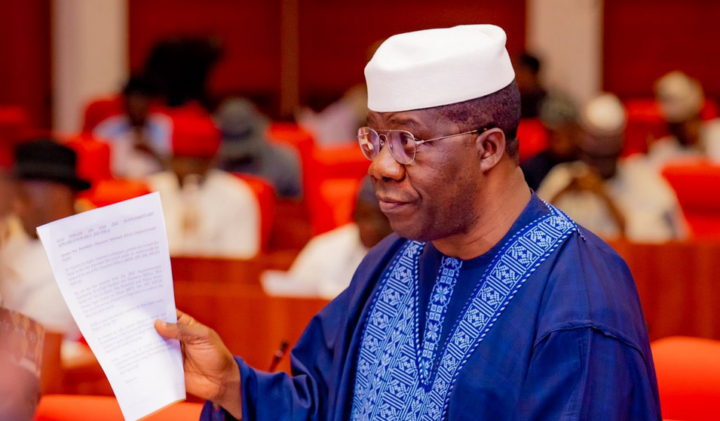Pic.4. Some commercial tricycle operators and other motorists queue for petrol at a filling station at Dutse Junction in Abuja on Monday (1/3/21).
00856/1/3/2021/Jones Bamidele/O/NAN
BY OLA EMMANUEL
“Most Nigerians, especially those born after 1973, have lived their lives under fuel subsidy. Hence, removing it is like a mother weaning off a child from breast milk. But then, while weaning children from breast milk is inconvenient to them, it is necessary for them to grow and become adults.” These are the words of Professor Adeola Adenikinju, the head of the department of economics and Centre for Petroleum, Energy Economics and Law while speaking at the famous Trenchard Hall of the University of Ibadan, as the guest lecturer at the 16th anniversary lecture series of SplashFM Ibadan. Very pinpointing as most Nigerians are not more than toddlers that are experiencing teething dilemmas in attitudes and dispositions. They love to play a lot and to have things delivered with ease, not minding what efforts and inputs are required for such to be achieved. Prof Adenikinju’s paper titled ‘Fuel Price Subsidy Removal: Causes, Impacts and Adjustment Responses’ captures everything perfectly.
Since May 29, 2023, Nigerians have been experiencing economic and financial shocks. Being a people with a thriving rumour and humour industry, a people with a bulging unemployed and underemployed workforce with less regard for proper learning and skills acquisition, a people with a significant number who are less concerned about knowledge and understanding, and a people that prefer consumption economy; not minding the effects of such flippancy on the general wellbeing of the country, a people whose public servants and the critical mass of the working class believe that government must be responsible for production and provide for them goods and services at little or no costs – a social welfare economy. Where these expectations are not met, the working class would move to other economies they believe offer better standards of living. They monitor government plans and policies but instead of interpreting correctly to elicit productive responses, they will rather turn such policies to butts of jokes and kick against their implementations. This has become a way of life, the trait of a people, and the country in turn is in a sorry state over years of neglect and indolence.
Like a people, like their leaders. Nigeria is a heterogeneous state, a country full of different people with different beliefs. While some groups want to do things for themselves to enable them to move very productively and develop faster, some groups believe in handouts coming from the government purse. Therefore, having dilly-dallied for more than ten years on the need to put an end to the unsustainable social welfare economic system the country was operating (due largely to lack of political will; and in order not to disrupt the unitary system of governance), the immediate past Muhammadu Buhari administration huffed and puffed for eight years without proper and meaningful action plan and implementation strategy necessary for the free market economy it planned to unleash with full deregulation of the energy and power sectors. The successor government that was sworn on May 29, 2023, put an end to the energy sector subsidy regime, thereby unleashing economic shocks that Nigerians, who have been enjoying decades of social welfare freebies, are finding not very funning and too bitter a pill to swallow.
Advertisement
However, with the full deregulation of the energy and power sectors, Nigeria has moved from a social welfare economy to a free market economy. Though Nigerians, especially the social welfarists, don’t trust the free markets situations for the provision of basic necessities like power and energy, the fact that very few opportunists had turned government interventions in the two sectors into a cesspool of corruption clearly shows that the country must rethink and restrategise, and very fast also. Therefore, the pronouncement, “subsidy is gone”, that was made the moment Tinubu was sworn in on May 29, 2023, actually put paid to an avenue for lobbying, manipulations and exploitations by the few that previous governments found so difficult to overcome.
Where we are now, it will still be difficult for Nigeria to operate full-fledged capitalism and sellers’ market due to the very high probability of monopoly, oligopoly and untamed supernormal profiteering. Therefore, we have to adopt a mixed economy, finding somewhere, that is, a location not too far away from pure capitalism on one end on a continuum that has socialism on the other extreme. Nigeria’s public sector has proven over a long period of time that they are bad managers of resources and cannot be trusted with managing the economy. Nigeria’s government and its civil servants have no business in business, hence social welfarism is out of the options.
In this vein, therefore, what some percentage of Nigerians are asking for, that the government should be involved or continue with price fixing, is no longer possible if this country is to move forward productively. We must encourage productivity and we must allow the private sector to fully take over through the free market system. The role of the government as things are, that calls for the mixed economy, is in exercising control and packaging far-reaching interventions in critical sectors to ensure the masses are not capitalistically ripped off or impoverished. To ameliorate the deregulation shocks, government must without delay implement a very good plan for the taxes it is targeting from the free market system by coming up with interventions for critical sectors such as transportation, education, agriculture and other key infrastructure development. Quoting Prof Adenikinju, “a liberalised petrol market goes beyond simple removal of the subsidy. Barriers to entry into the market must be eliminated to allow for competition and reduce possibility of the exercise of market power by any of the market operators”.
Advertisement
The issue before us now is how should people respond in a fully liberalised free market; and what should be the effective role of the government to factors driving the free market. A free market system and a mixed economy demand that the government comes up with very strong anti-trust regulations, local production protections, fiscal stimulus, promotion of target sectors, subsidy for some essentials, targeted tax holidays to stimulate local productions, deliberate penalization of imported finished products, discouragement of foreign exchange for consumption of foreign goods and services, and public-private partnerships.
The federal and various state governments must get their priorities right and show good character to prove their mettle in giving the country a good direction. Also more than anything, this is not the time for Nigerians to embark on lamentations, naggings and grumblings like the Israelites in the wilderness. In a free market system, production is in the hands of the people and it is their duty to create wealth. It is time to be very strategic since at the initial stage of a free market system, a costs driven economy is usually very volatile with highly flagellating costs, hardly-predictable market reactions, supernormal profiteering, business template distortions, and enthronement of a new normal.
The free market economy we now prefer means the free flow of money must be allowed. At first glance, people’s consumption and purchasing powers must be boosted. This must not be limited to a commensurate increase in government employees’ salaries only. Private sector players must be able to enjoy market patronages that will enable them to increase salaries also and create more jobs. Entrepreneurs must not be left out. Grants and easy credit facilities must be made available to stimulate MSMEs. We have opted for cost-driven economy, therefore effective responses should be income-generation-driven. How best to reposition for a better deal, great rewards and exemplary living standards should be the focus of every individual.
Ola Emmanuel is a business planning consultant and founder of Leacent Incorporated Trustees, a network of entrepreneurs and group of cooperatives. He works with a team of international consultants to conceptualise and plan agribusiness and housing projects. He can be reached via +234(0)9068602954 (call and sms), +234(0)8023257707 (whatsApp only).
Advertisement
Views expressed by contributors are strictly personal and not of TheCable.
Add a comment






